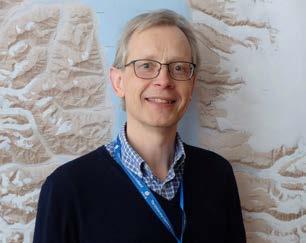
3 minute read
FROM THE DIRECTOR
UNIS exploits the advantages that our favourable location offers, making it possible for the universities on the Norwegian mainland and our partners to have easier access to the Arctic for their research and education. With 213 student-labour years in 2019 divided among 743 students from 43 countries, UNIS makes a significant contribution to recruiting, motivating and training the next generation of polar scientists.
For Norwegian students, a period of study at UNIS is easily accessible and, I would say, a convincing alternative to a period of study abroad. In addition to offering an international, extremely social, safe and good student environment, we offer international teaching through an extensive guest lecturer programme. Students at UNIS develop contact networks that expand their horizons for future careers.
Advertisement
Fieldwork in the surrounding areas is at the core of UNIS’ educational provision, and the major resources we can use on students in the field and on research cruises is what distinguishes us from other higher education institutions. Svalbard has a favourable location for global climate and environmental studies. The students live close to the forces of nature and are given opportunities to observe and research the impacts of global pollution and climate change. Scientific knowledge is put to practical use to handle natural hazards and one’s own safety. Thorough safety training on arrival enables our students to practice safe and secure behaviour and, in so doing, develop skills that are sought-after by future employers.
We prioritise using our resources on quality education and research and, as the annual report shows, we succeed with this.
SAMCoT – Sustainable Arctic Marine and Coastal Technology – was discontinued in 2019. SAMCoT was a Centre for Research-based Innovation. UNIS was a partner in SAMCoT right from its inception in 2011 when the ambition was to be an international leader in the development of robust technologies used by the industry operating in the Arctic. The goal of SAMCoT was to perform research that would help the industry achieve environmentally friendly development of the Arctic where ice, frozen soil/permafrost and coastal erosion represent unique challenges.
By pursuing this goal and achieving success, SAMCoT played a role in making the host institution, the Norwegian University of Science and Technology (NTNU) and its key research partners, UNIS and SINTEF, a leading international centre for Arctic science and technology. The consortium consisted of 9 research partners, 12 industrial partners and 2 public partners. The Department of Arctic Technology the Technical and Logistics Unit at UNIS have played a key role in this development. We will continue to develop this competence in the future.
Jøran Moen is managing director of UNIS. Photo: Eva Therese Jenssen/UNIS.
We are still a partner in a Norwegian Centre of Excellence in space physics research and a Centre of excellence in biology education, and in 2020 we will be a partner of another Centre of excellence in geoscience education. In addition, we have a stable portfolio of major and minor research projects and in 2019 had 161 articles published in peer reviewed journals.
Norway ranks third in the Arctic behind the United States and Canada when it comes to research. Outstanding research, research training and the recruitment of young research talents is important for Norway to further strengthen its position in international polar research. Furthermore, we must position our research infrastructure so that it is part of an international Earth observation system. UNIS is partner in the Svalbard Integrated Arctic Earth Observing System (SIOS). SIOS aims to coordinate all Earth observations in Svalbard, so that we can succeed in Svalbard becoming an integrated part of a global Earth observation system.
On 3 October 2019, the government presented its strategy for innovation and economic development in Svalbard. This strategy provides major development opportunities for UNIS and our partners. The government provides clear signals that it will prioritise knowledge-based industry in Svalbard, and it shows a willingness to act. UNIS gained two additional PhD positions earmarked energy, which poses a significant challenge from a sustainability perspective. We also received support to further develop the Arctic Safety Centre, which will contribute to increasing the competence in safe human activity in the Arctic, with special emphasis on developing the centre’s relevance and provision for the industry. Development of innovation and societal relevance are in line with UNIS’ Strategy 2025 and will be key in the further development of the institution.











